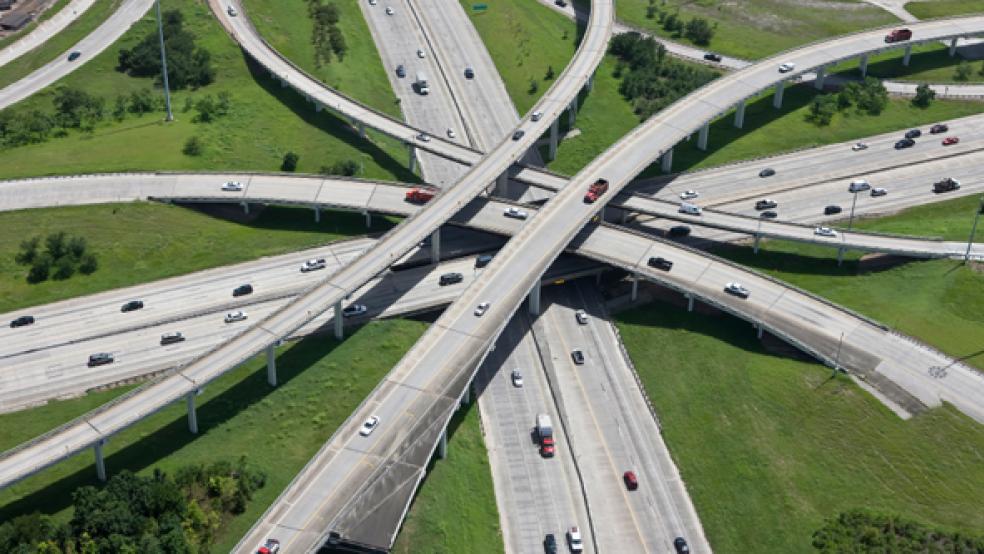The Obama administration warned Tuesday that failure to avert a threatened bankruptcy of the federal Highway Trust Fund this summer could mean the delay of about 112,000 roadway projects and 5,600 transit projects – and cost the economy as many as 700,000 construction jobs in the next year.
The Department of Transportation has projected that the Highway Trust Fund, which finances more than $50 billion a year in major highway, bridge and transit projects, is running out of money and will dip below the critical level of $4 billion as early as July. The trust fund has been financed by receipts from an18.4 cents per gallon gas tax and a 24.4 cents per gallon diesel fuel tax. More recently, revenues have seriously lagged behind highway project expenditures and the government has had to shift money from other accounts to keep the fund solvent.
Related: Why You’ll Need a Tank to Drive America’s Highways
After this year’s terrible winter, some state and local governments have already begun pulling back on plans for critical road repairs. Things could get worse if Congress and the Obama administration allow a four-year transportation funding authorization law to expire this fall without a replacement.
“The moment is dire,” Transportation Secretary Anthony Foxx said at a Bloomberg Government event Tuesday. He said the trust fund “is quickly running toward insolvency.”
“We’re already seeing states slowing down their programs of work,” Foxx also told D.C. radio station WTOP. “By June or July, we’ll start to see states slowing down some ... contracts [for] the fall. We have 700,000 jobs that are going to be at risk. Obviously, we’re losing the opportunities to create the connections and the safety that Americans count on in their road systems.”
Related: Obama Floats Interstate Toll Option to Fund Road Repair
As just one example, Democratic Gov. Pat Quinn of Illinois recently announced a six-year transportation plan to complete dozens of key projects. But because the plan anticipates using $6.99 billion in federal funding to match $1.16 billion in state funding and $450 million in local funding, projects may not make it off the drawing board without the certainty of that federal contribution, according to a new study by Transportation for America, an alliance of elected, business and civic leaders.
Recently, Foxx visited the site of a bridge replacement and corridor improvement in the Quad Cities on the border of Iowa and Illinois. The project could face serious delays if new work can’t begin next year.
Lawmakers are grappling with a Sept. 30 deadline for reauthorizing the government’s surface transportation bill, which provides funding for road and transit projects nationwide. A Senate panel this week unveiled bipartisan legislation that would authorize six years of highway programs acting with construction projects at risk of slowing months before the November mid-term congressional elections.
Related: A Glimmer of Hope for Ending Highway Construction Crisis
The bill, drafted by Senate Environment and Public Works Committee Chairwoman Barbara Boxer (D-CA) and other members, would provide the current level of spending plus inflation. However, it doesn’t address how precisely to raise the revenue – a matter that will be left until later for congressional tax-writers and that threatens the proposal’s chances of making it into law.
Meanwhile, House Transportation and Infrastructure Committee Chairman Bill Shuster (R-PA) hasn’t yet offered his version of the legislation.
The non-partisan Congressional Budget Office told senators recently they would have to either increase the federal gas tax by 10 or 15 cents per gallon – a nonstarter in an election year – or find between $13 billion and $18 billion per year from other sources to maintain current infrastructure spending projects.
During his Bloomberg appearance yesterday, Foxx said that temporarily boosting U.S. taxes on companies’ overseas earnings is the most feasible way to provide the additional funding needed to rebuild aging highways and mass transit systems.
President Obama proposed a four-year, $302 billion bill that would raise $150 billion through taxes on overseas earnings and by closing loopholes that would normally let companies defer those obligations.
Related: Obama Looks to Tax Reform to Save America’s Highways
Senate Finance Committee Chairman Ron Wyden (D-OR) so far has declined to take a position on the funding source. He said he was against passing a short-term extension by the Sept. 30 deadline for reauthorizing the current surface transportation-funding bill. “It would be a tragic mistake to let highway funding become another stop-and-go extender,” Wyden said.
“Right now our proposal is the best way to thread the needle and get something done,” Foxx said of Obama’s overseas earnings tax plan.
In another bid to highlight the looming highway funding crisis, Obama will be in New York on Wednesday to discuss U.S. infrastructure needs near the 58-year-old Tappan Zee Bridge, which connects Westchester and Rockland counties, north of Manhattan, and was designed to last just 50 years. A $3.9 billion replacement is currently in the works.
Top Reads from The Fiscal Times:
- Geithner Book Settles Scores, Defends Policies
- Overregulation Is Killing America’s Can-Do Spirit
- House Republicans Propose Controversial Tax Vote





